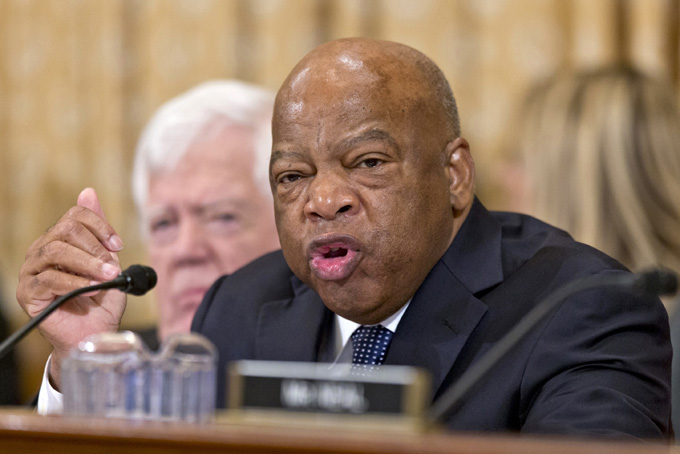
WASHINGTON (AP) — The Israeli prime minister’s upcoming speech to Congress without President Barack Obama’s blessing has angered Democratic lawmakers, but they see little remedy except to hope for minimal damage to their party and U.S.-Israel relations.
Democrats simmered in frustration as they faced a thankless choice between defending their president and defending a country they consider a vital ally.
Some gleeful Republicans predicted Democrats’ complaints about Benjamin Netanyahu’s March 3 speech will drive Jewish voters to the GOP.
Rep. Joe Wilson, R-S.C., a member of the House Armed Services Committee, said Democrats are making a “catastrophic mistake” by protesting Netanyahu’s plans.
“Traditionally, supporters of Israel have been really evenhanded in supporting candidates of both parties,” Wilson said, but now “Democrats are slapping the friends of Israel in the face.”
Democrats reject such talk, saying Republicans repeatedly have overstated their appeal to Jewish voters. Obama got 78 percent of the Jewish vote in 2008, and 69 percent in 2012, according to exit polls. Congressional Democrats won two-thirds of Jewish votes in last fall’s elections, an especially bad year for their party.
Republicans want to portray Democrats as less supportive of Israel, “but no matter how much they try, they can’t move Jewish voters on this issue,” said Jeremy Ben-Ami, president of the liberal pro-Israel group J Street.
House Democrats say Speaker John Boehner, R-Ohio, showed disrespect to the president — and perhaps cynical political goals — when he invited Netanyahu. Presidents can’t veto congressional speakers, but they usually are consulted.
Many Democrats object for three reasons.
The invitation rebukes Obama. The speech, scheduled three weeks before Israel’s elections, might be designed to boost Netanyahu’s re-election hopes. And Netanyahu is certain to back new penalties against Iran that the Obama administration and Western powers argue could scuttle sensitive negotiations over Iran’s nuclear program.
The speech is set for three weeks before the deadline for the U.S. and its international partners to reach a framework agreement with Iran that could provide an outline for a more comprehensive deal to be finalized by late June.
Netanyahu says an accord could make it easier for Iran eventually to develop nuclear weapons. Iran says its nuclear program is for peaceful purposes only. Obama says he will reject any deal that doesn’t safeguard Israel and other countries.
Still, some Democrats favor tougher sanctions. But they weren’t pleased by Netanyahu’s acceptance of Boehner’s invitation. Soon after the speaker’s announcement, several Democratic senators postponed their sanctions push, giving Obama and the negotiators more time.
Obama’s chief concern about the break in protocol, his spokesman Josh Earnest said, “is to ensure that the strong relationship between the United States and Israel is protected from partisan politics.”
In the House, some Democrats say they won’t attend Netanyahu’s address. The way it was scheduled was “an affront to the president and the State Department,” said Rep. John Lewis of Georgia.
Rep. G.K. Butterfield of North Carolina called Boehner’s actions unprecedented, and that Netanyahu has “politicized” his U.S. visit.
The speaker of the House and the vice president traditionally sit behind the featured guest during a congressional address. But the White House said Friday that Vice President Joe Biden will be abroad that day.
Rep. Lee Zeldin of New York, Congress’ only Jewish Republican, said if lawmakers boycott Netanyahu’s speech, “it’s a horrendous, irresponsible message to send to Israel.” He called Israel “a free, democratic society thriving in an area of the world where radical Islamic extremism is growing most rapidly.”
Zeldin predicted many more Jewish voters will embrace Republicans because of Obama’s policies regarding Israel.
House Democratic leader Nancy Pelosi of California, another critic of the speech’s arrangements, said she will attend. Lawmakers often skip such addresses for different reasons, she said, so even if some seats are empty, “don’t even think in terms of the word ‘boycott.’ Members will go or they won’t go, as they usually go or don’t go.”
Pelosi and other top Democrats have hinted they want Netanyahu to postpone his speech until after Israel’s elections, and — or — hold it somewhere other than Congress.
Conservatives see little incentive to do that. Boehner is happy to have Democrats grouse while Israel’s leader addresses a Republican-run Congress, they say. Netanyahu probably benefits politically by speaking to Congress and criticizing Iran.
On Saturday, Israeli opposition leaders said the controversy had damaged ties with the United States and they urged Netanyahu to cancel.
Obama and Netanyahu have clashed repeatedly over the years, even though both say a close U.S.-Israel alliance is essential. Only days ago, the White House again criticized Israel’s policy of building Jewish settlements on West Bank and East Jerusalem areas that Palestinians claim.
Obama says a Mideast peace deal must include a Palestinian state based on territory Israel captured in 1967, with “mutually agreed upon swaps” to ensure Israel’s security. Netanyahu rejects a return to those borders, and the Jewish settlements complicate efforts to divide territory.
Obama has no plans to meet with Netanyahu during his U.S. trip.
Numerous U.S. activists and lawmakers predict the quarrel over the March 3 speech will die down soon. There’s no need “to pile on,” even though the speech’s arrangement was a mistake that triggered “a lot of blowback, both in Israel and here,” said Democratic Rep. Peter Welch of Vermont.
Josh Block of the Israel Project said Israel remains broadly popular in America, and “it’s likely we’ll see folks calm down.”
___
Associated Press writers Josef Federman in Jerusalem and Andrew Taylor in Washington contributed to this report.